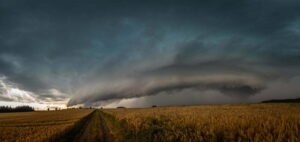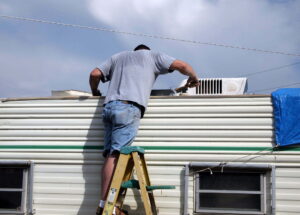Whether your caravan is sitting on the driveway, you’re holidaying or it’s being used as a home, storms can be scary. As UK weather gets more extreme, with 40-degree heatwaves, it’s not uncalled for to worry about extreme weather.
Firstly, remember that caravans are designed to be used all year round, regardless of weather conditions so it’s simply a case of being prepared and there’s no need to worry about your caravan in a storm or heat wave.
If you’re looking to upgrade your caravan or are interested in purchasing your first ever caravan, take a look at our range of static caravans online and contact us for further assistance.

Is my caravan safe in a storm?
Caravans can be safe in a thunderstorm as long as all windows and doors are closed. The outside of a caravan can act as a faraday cage which allows lightning strikes to go straight into the ground and not harm anyone. As there are tires on caravans (even on static caravans), the rubber helps to ground electricity during a lightning strike.
However, it is always recommended to seek covered shelter during severe thunderstorms since a smaller caravan may be at risk of damage from high winds or nearby falling trees.
How should I prepare for a severe storm?
Check your location on-site
If your property is located under trees or near bushes or heavy objects, this could become dangerous if there is a lightning strike or severe thunderstorms which cause debris. If you are concerned about your location, then write to your site management and request this be rectified. If you’re on your own property, see if there’s a way you can move your caravan to a safer location. Ensure you keep your communications in case you need to utilise your caravan insurance.
If you have trees on your site, do not shelter beneath them because trees are lightning conductors and are dangerous.
Bring a porch awning
If you go on a walk and get caught in the rain, it’s worth having a porch awning to provide cover for your wet clothes or to sit and enjoy the weather. Your awning will also keep your heat inside and if you have an awning mat, you can use this to store wet shoes and dry off your pets.
Of course, if it starts flooding or you expect the weather to get worse, then pack this up and store it somewhere safe.
Anchor your static caravan
This may be required as part of your static caravan insurance, but it’s important to anchor your home and check this periodically.

Top tips for preparing for bad weather
Close all doors and windows
This will help create the faraday cage effect as well as ensure that there will be less damage caused by heavy winds. Don’t forget to make sure your skylight is securely closed.
Take down your aerial
Your aerial and aerial brackets could act as lightning conductors, so it’s worth taking it down when there are storm warnings or when you’re away from your caravan.
Check your gutters and downpipes
Before a storm, it’s necessary to ensure your gutters and downpipes are clear of any debris and check that they are securely attached to your caravan.
Secure everything in and around your campsite
Secure your sheds, gas cylinders, garden furniture, storage boxes and anything else. If you have nowhere to store it, place it away from your caravan and ensure that if the heavy winds cause danger, it won’t harm anyone.
Check in on your caravan while you’re away
If you are away during a stormy season, it’s worth asking a neighbour or relative to inspect the caravan once conditions improve to make sure the caravan is secure and there is no damage.
What should you check for after bad weather?
During the winter months, your caravan might get cold and damp when there is heavy rain and strong winds so either before you use it, or whilst you’re using your caravan, it’s crucial to check the following things:
- Check for cracks or any damage from frost or snow on the outside of your caravan, double-check all pipes and ensure that the temperature fluctuations haven’t damaged your caravan facilities.
- Look at the inside of your caravan for mould, dampness or any leaks
- Check your batteries, gas bottles, and any other equipment you use for the everyday running of your caravan
- Ensure you have caravan insurance in case of any damage or issues and have the information in an easy-to-access place, free from any damage from the weather
How do I keep my static caravan warm?
During high winds and extreme weather conditions, it can get chilly inside your static caravan. Here’s how you can improve conditions
LPG gas vs Propane gas
LPG gas remains a gas until -40°C, while propane gas will not be a gas below 10°C. It’s important to have a propane regulator which will reduce the gas flow from your gas bottles to the appliance. Make sure you don’t run out of gas by having several gas bottles spare.
Mains electricity
If you stay on a site offering electric hook-ups you could supplement your caravan’s heating system with a portable heater. The amount of electricity needed can vary however according to the number of caravans connected to the bollard, so make sure you have spare 12V batteries to plug into if there is a blackout.
Central heating and double glazing
Double glazing and central heating in your static will ensure a more comfortable temperature all year round. You can purchase static caravans with these features already installed, or have them fitted retrospectively.
How do I prevent my water supply from freezing?
Ideally, your water supply would be on board so the water should not freeze, but if it is contained externally, then it might be worth investing in an insulation sleeve. The best ones wrap around the tank, rather than being lowered into the sleeve.
Add salt to your waste water to prevent it from freezing so you can dispose of it properly.
If you’re away, then drain your water and waste tanks so you don’t have any issues with broken tanks upon your return.
Looking for a static home?
You’ve come to the right place! We sell new and used static caravans, and have caravans available for hire. Contact us today for our expert advice for all your caravanning needs.
< Back to Blog